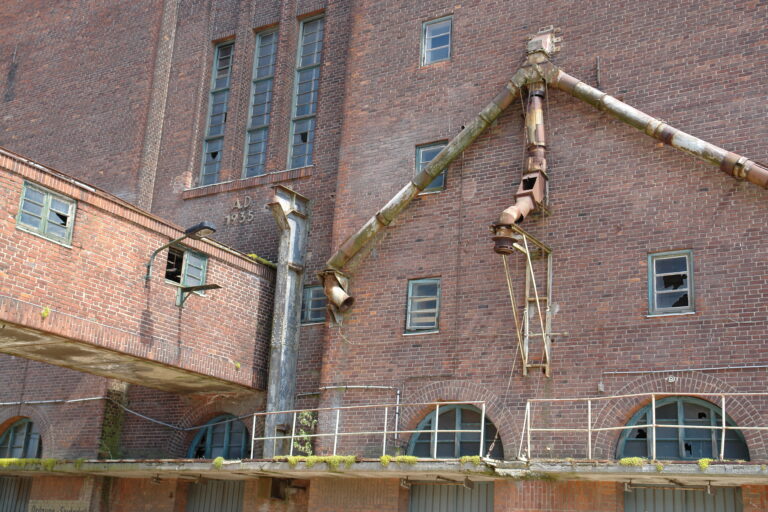In 1855, Joseph Löwenthal and Semmy Nord founded the grain wholesaler Joseph Löwenthal & Co. in Bützow with headquarters in Schwerin.
The company quickly developed into an important player in the grain trade and expanded into numerous cities, including Wismar, Rostock and Lübeck. The company traded not only in grain, but also in seeds, fertilizers, animal feed and wool.
The rise of Paul Ohlerich and the "Aryanization"
At the end of the 19th century, Paul Ohlerich joined Löwenthal & Co. and later became a partner. After the National Socialists seized power, he used his position to force the Jewish co-owners out of the company and take it for himself. This process of expropriating Jewish property is known as "Aryanization". The Löwenthal family was persecuted and suffered heavy losses under the Nazi dictatorship.
The construction of the Ohlerich reservoir
The imposing Ohlerich warehouse in Wismar was built in 1938. The building was one of the most modern of its kind at the time and was used to store large quantities of grain.
The time after the Second World War
After the war, the company was nationalized and the warehouse was used by the GDR state economy. After reunification, the building stood empty for a long time until it was extensively renovated and converted into a residential building in the 2000s.
The significance for Wismar
The history of the grain wholesaler Löwenthal & Co. and the Ohlerich warehouse is closely linked to the history of Wismar. It reflects the rise and fall of a successful company, but also the dark chapters of German history. Today, the Ohlerich warehouse is a testimony to this past and a popular landmark of the city.
The Löwenthal family was a prime example of the rise of Jewish entrepreneurs in Germany in the 19th century. They built up a successful business that made an important contribution to the region's economy. However, their lives changed abruptly when the National Socialists seized power.
Ascent and success
Joseph Löwenthal and his partners founded the company with the aim of gaining a foothold in the growing grain trade. Through hard work, entrepreneurial skill and a good network, they succeeded in developing the company into one of the leading grain traders in the region. The Löwenthals were firmly integrated into the local community and enjoyed a good reputation.
The shadows of persecution
With the increasing radicalization of the National Socialists, the situation for Jewish entrepreneurs changed dramatically. The Löwenthal family was discriminated against, their property expropriated and they were eventually expelled from their home country. The exact circumstances of the persecution and deportation of the Löwenthal family are often sketchy. Many family members were deported to concentration camps and murdered.
The "Aryanization" and its consequences
The takeover of the company by Paul Ohlerich is a sad example of so-called "Aryanization". This process enabled National Socialists and their sympathizers to expropriate Jewish property and enrich themselves. The Löwenthal family not only lost their company, but also their assets and their livelihood.
The fate of the Löwenthal family
The fate of the Löwenthal family is a tragic example of the effects of the Holocaust. Many family members were murdered, others were able to flee and emigrate to other countries. Those who stayed behind had to fight for their survival and were often persecuted and harassed by the National Socialists.
Commemoration and remembrance
Today, we remember the Löwenthal family and the many other victims of National Socialism. Stumbling stones in front of their former homes keep their memory alive and remind us not to forget history. The story of the Löwenthal family is a memorial against anti-Semitism, racism and intolerance.
Address
Stockholmer Str. 20, 23966 Wismar
Info
You can visit the buildings from the outside at any time




